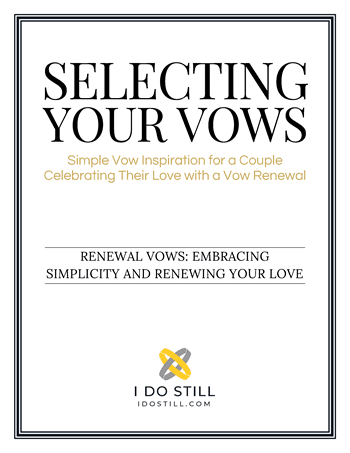Vow Renewal Glossary: Essential Terms You Need to Know
Vow Renewal Glossary: Essential Terms You Need to Know
Navigate the world of vow renewals with confidence. Our comprehensive glossary defines essential terms, helping you plan your special day with ease.

Planning a vow renewal is a special journey that allows you to celebrate your enduring love and commitment. However, as with any significant event, it comes with its own set of terms and terminology that might not be familiar, especially if you didn’t plan your original wedding or if the concept of vow renewals is new to you. This glossary is designed to help you navigate the key terms you’re likely to encounter, making the planning process smoother and more enjoyable. With these definitions, you’ll feel informed and empowered as you plan your special day.
Common Vow Renewal Terms
Vow Renewal
A vow renewal is a ceremonial event where a married couple reaffirms their commitment to one another. Unlike a wedding, it does not involve legal paperwork or the formalities of establishing a new marriage. Vow renewals are often held on significant anniversaries or after the couple has overcome challenges together. The ceremony can be as simple or as elaborate as the couple desires, reflecting their unique journey.
- Purpose: Celebrating a lasting marriage, reaffirming love, and often marking a milestone anniversary.
- Typical Components: Exchange of vows, a symbolic gesture like a unity ceremony, and a celebration with family and friends.
Officiant
The officiant in a vow renewal ceremony is the person who leads the ceremony, guiding the couple through their vow exchange and any other planned rituals. While this role is similar to that of a wedding officiant, it’s more flexible since there are no legal requirements for a vow renewal. The officiant can be a religious leader, a professional officiant, or even a close friend or family member.
- Role: Leading the ceremony, facilitating the vow exchange, and ensuring the event reflects the couple’s wishes.
- Flexibility: Since no legal documentation is required, anyone can serve as an officiant, making the ceremony deeply personal.
Processional
The processional is the part of the ceremony where the participants, including the couple, make their entrance. In a vow renewal, this can be as formal or informal as you like. Some couples choose to recreate the processional from their wedding, while others opt for a more relaxed entrance together.
- Structure: The order of participants entering the ceremony space, often including the couple, children, and close family or friends.
- Personalization: Couples can choose music that reflects their journey together or opt for a unique entrance that differs from their original wedding.
Unity Ceremony
A unity ceremony is a symbolic ritual that represents the joining of two lives. Popular options include the lighting of a unity candle, pouring different colored sands into a single container, or planting a tree together. These ceremonies are a powerful way to symbolize the ongoing unity and growth of the couple’s marriage.
- Examples: Unity candle, sand ceremony, tree planting.
- Significance: Represents the couple’s continued commitment to one another and the merging of their lives.
Recessional
The recessional marks the end of the vow renewal ceremony when the couple and their guests exit the ceremony space. This can be accompanied by joyful music and often mirrors the processional in its structure.
- Purpose: Signals the conclusion of the ceremony and the transition to the celebration (e.g., a reception or dinner).
- Customization: The couple can choose music that reflects their joy and excitement as they begin the next chapter of their marriage.
Renewal Vows
Renewal vows are the promises the couple makes to each other during the ceremony. These vows can be the original wedding vows, slightly modified, or entirely new vows that reflect the couple’s journey since their wedding day. Writing personal vows is a common practice for vow renewals, allowing each partner to express their love and commitment in their own words.
- Personalization: Vows can be deeply personal, reflecting the experiences and growth of the marriage.
- Tips for Writing: Focus on the journey you’ve shared, the challenges you’ve overcome, and your hopes for the future.
Guest Book
A guest book is a traditional element where guests can leave their signatures and well-wishes for the couple. In a vow renewal, the guest book serves as a keepsake that captures the love and support of those who witnessed the reaffirmation of vows.
- Purpose: A memento of the day, filled with messages from loved ones.
- Modern Alternatives: Guest books now come in many forms, including custom photo books, wish boxes, or even digital versions.
Anniversary Dance
The anniversary dance is a special moment during the reception where couples attending the vow renewal who have been married for varying lengths of time are invited to the dance floor. As the music plays, couples are gradually asked to leave the floor based on how long they’ve been married, leaving the couple with the longest marriage dancing alone. This dance honors long-lasting love and commitment.
- Significance: Celebrates long-term marriages and highlights the couple’s journey alongside others who have also experienced enduring love.
- Customization: Some couples choose to start this dance themselves, inviting others to join them in a celebration of lasting love.
Additional Planning and Event Terms
Reception
The reception is the celebration that follows the vow renewal ceremony. It can range from a formal dinner to a casual backyard barbecue, depending on the couple’s preferences. The reception is a time for the couple to celebrate with family and friends, often including food, drinks, and entertainment.
- Variety: Receptions can be formal or informal, reflecting the tone of the vow renewal.
- Activities: Common elements include toasts, dances, and cutting a cake, similar to a wedding reception.
Save-the-Date
Save-the-dates are notices sent to potential guests well in advance of the vow renewal to ensure they mark their calendars for the event. While not always necessary, they are helpful for larger or destination vow renewals where guests may need to make travel arrangements.
- Timing: Typically sent 6-12 months before the event, especially for destination renewals.
- Purpose: Helps guests plan ahead and increases the likelihood of their attendance.
Invitation Etiquette
Invitation etiquette refers to the proper way to invite guests to your vow renewal. This includes how to word the invitations, when to send them, and how to address guests. The tone of the invitation should reflect the formality of the event, and it should clearly communicate key details like the date, time, location, and dress code.
- Timing: Invitations are generally sent 6-8 weeks before the event.
- Content: Include essential details and consider adding a personal touch to reflect the nature of your relationship.
RSVP
An RSVP (“Répondez s’il vous plaît,” French for “Please respond”) is a request for guests to confirm their attendance at the event. Managing RSVPs is crucial for planning purposes, as it helps you finalize numbers for seating, catering, and other logistical aspects.
- Importance: Ensures accurate headcounts and smooth planning.
- Methods: RSVPs can be requested via traditional mail, email, or an online event page.
Vendor
A vendor is any service provider involved in your vow renewal, such as a caterer, florist, photographer, or musician. Working with reliable vendors is key to ensuring that your event runs smoothly and meets your expectations.
- Types of Vendors: Common vendors include caterers, photographers, florists, and entertainment providers.
- Selection: Choose vendors based on their reputation, portfolio, and ability to align with your vision.
Venue
The venue is the location where your vow renewal will take place. This could be a church, beach, garden, or even your backyard. Choosing the right venue is crucial, as it sets the tone for the entire event.
- Considerations: Think about size, location, weather (if outdoors), and how the venue fits with your theme.
- Booking: Popular venues may need to be booked well in advance, especially during peak seasons.
Vow Renewal Attire and Décor Terms
Attire
Attire refers to what the couple and their guests will wear at the vow renewal. Unlike weddings, vow renewal attire is often less formal, but it can still be as elaborate or simple as the couple desires. Some choose to wear their original wedding attire, while others opt for new outfits that reflect their current style.
- Options: Original wedding outfits, formal wear, or more casual attire.
- Theme Consideration: Attire should complement the overall theme and formality of the event.
Bouquet and Boutonniere
These are floral arrangements that the couple and sometimes their attendants wear during the ceremony. The bouquet is typically carried by the bride, while the boutonniere is worn by the groom and other male attendants.
- Bouquet: Can be similar to the original wedding bouquet or something entirely new.
- Boutonniere: A small flower or arrangement worn on the lapel, often matching the bride’s bouquet.
Décor
Décor includes all the visual elements that set the scene for your vow renewal, from flowers and lighting to table settings and backdrops. Décor should align with the theme and tone of the event, creating a cohesive and visually appealing environment.
- Elements: Flowers, lighting, table settings, and other decorative items.
- Theme Alignment: Choose décor that enhances the theme and atmosphere of the event.
Legal and Logistical Terms
Marriage License
A marriage license is a legal document required for a wedding but not for a vow renewal. Since a vow renewal does not establish a new legal marriage, there’s no need for a marriage license. However, this distinction is important to understand, especially if you’re planning a ceremony that closely resembles a wedding.
- Requirement: Not needed for vow renewals.
- Significance: Differentiates a vow renewal from a legal wedding ceremony.
Coordinator
A coordinator is a professional who assists in organizing and executing the vow renewal ceremony. This role can range from full-scale planning to just day-of coordination. A coordinator helps ensure that everything runs smoothly, allowing you to enjoy the day without worrying about logistics.
- Types: Full-service planners, day-of coordinators.
- Role: Handles logistics, vendor coordination, and timeline management.
Timeline
A timeline is a detailed schedule that outlines the flow of events during the vow renewal day. It includes everything from the arrival of vendors to the ceremony start time and the timing of the reception activities. A well-planned timeline is crucial to ensure that the event runs smoothly and on time.
- Importance: Helps keep the event organized and on schedule.
- Creation: Often developed by the coordinator or planner in collaboration with the couple.
Final Thoughts
Understanding the terminology associated with vow renewals can make the planning process much more manageable. This glossary provides definitions and explanations for some of the most common terms you’ll encounter, helping you feel more informed and empowered as you prepare for your special day. Whether you’re navigating the logistics of invitations, deciding on ceremony elements, or selecting the perfect attire, having a clear understanding of these terms ensures that your vow renewal will be as stress-free and meaningful as possible.
Bookmark this glossary and refer to it as needed throughout your planning journey. With these terms at your fingertips, you’ll be well-equipped to make informed decisions and create a memorable celebration of your enduring love.


